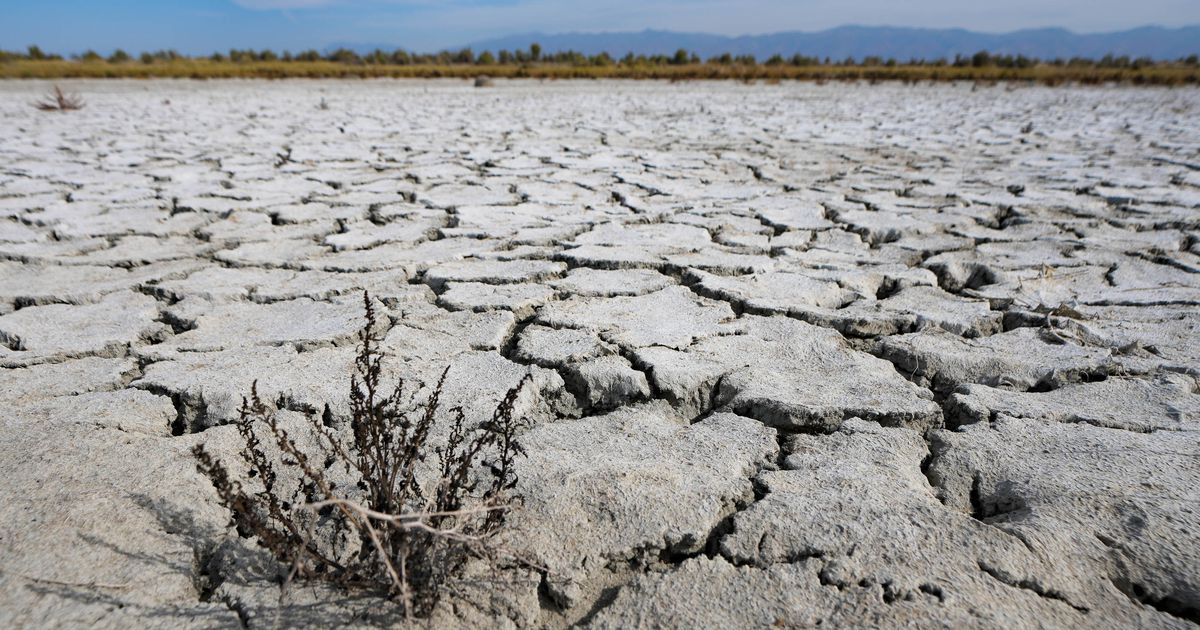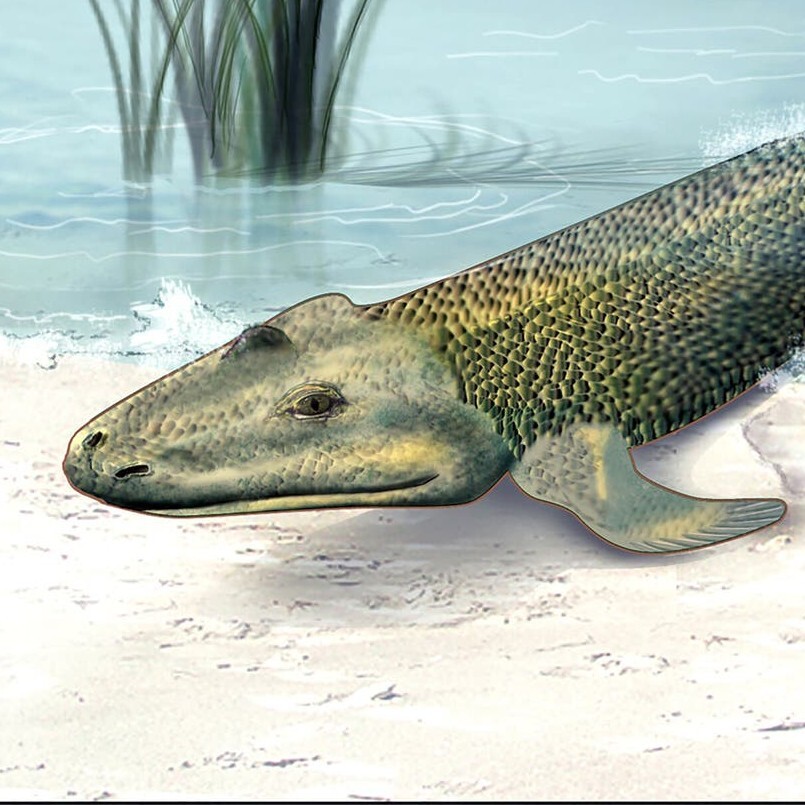article text
Days before Utah lawmakers are set to convene, dozens of researchers are calling on them to take bold action and save the Great Salt Lake before it withers away.
An emergency briefing released Thursday warns of “unprecedented” danger to Utah’s public health, environment and economy if the lake does not receive a “dramatic” influx of water by 2024. The lake has already hit record-low elevations for two years in a row, exposing 60% of its lakebed which continues to dry into a toxic source of dust pollution. Excessive water use in the Great Salt Lake’s basin means the lake is set to disappear in the next five years, the report warns.
“The decisions we make in the coming few months will affect our community and ecosystems across the hemisphere,” said Ben Abbott, a professor of Aquatic Ecology at Brigham Young University and lead author of the briefing, in a news release.
Scientists and conservationists with Westminster College, Friends of Great Salt Lake, the University of Alberta, Utah State University, Wasatch High School, Utah Valley University, Great Salt Lake Audubon and more co-authored the study.
The Utah Legislature took some of its biggest conservation measures to date last session in an effort to save the Great Salt Lake. They took a helicopter tour of its massive exposed lakebed and approved a $40 million trust to secure water rights and improve habitat for the lake. They funneled millions toward mandatory secondary water metering. They revised the state’s pioneer-era water laws to allow farmers to lease their water rights and use them to benefit environmental interests like the Great Salt Lake.
In recent months, Gov. Spencer Cox closed the lake’s watershed to new water rights. His latest budget proposal calls for $132.9 million to help the lake specifically, along with another $217.9 million for statewide water conservation.
But lake researchers and advocates say it’s not enough.
The briefing calls on the governor to take emergency action to save the Great Salt Lake, including a requirement that 2.5 million acre-feet reach it each year until waters rise to a sustainable elevation.
Lawmakers also need to set aside a significant amount of money to ensure all the recent policies they’ve adopted lead to water making it all the way to the lake, according to the report. The agriculture industry has so far expressed reluctance about fallowing fields and leasing water, even as state leaders constantly tout those measures as winning solutions for the Great Salt Lake.
And, the briefing adds, conservation efforts need to be far more aggressive by every water user in the Great Salt Lake’s watershed. Attempts to date have delivered just a drop of what it needs to recover.
“We are in an all-hands-on-deck emergency,” the report warns, “and we need farmers, counties, cities, businesses, churches, universities, and other organizations to do everything in their power to reduce outdoor water use.”
State lawmakers must think bigger, the report notes, and recognize the lake’s right to exist.
“This respectful approach to God’s creation,” the report says, “is in line with the religious and cultural teachings of the Indigenous and immigrant peoples of Utah.”
Meanwhile, the Great Salt Lake’s collapse has begun. High salinity levels have all but wiped out brine flies, which support millions of migrating birds. Microbialite colonies that serve as the foundation of the lake’s food web have surfaced and died. The lake’s multimillion-dollar mineral extraction industries can’t reach the brine they need, marinas are dry and the lucrative aquaculture industry could go bust next year if rising salinity wipes out the lake’s brine shrimp.
The report estimates the lake contributes $1.8 billion to Utah’s economy and supports 8,800 jobs.
“In the face of this [crisis], we need our state leadership to say, ‘Not on my watch,’” said Lynn de Freitas, executive director of Friends of Great Salt Lake, “and do whatever it takes to pull the lake back from the edge.”
Talk of pipelines to the Pacific, new dams and cloud seeding imply state leadership may not realize how imminent the catastrophe looms, or how dire its consequences will be.
“Conservation is the only way to provide adequate water in time to save Great Salt Lake,” the report says. “Conservation is also the most cost effective and resilient response.”
And while climate change and the West’s “megadrought” are creating water shortages and environmental stress across the region, human consumption is mostly to blame for the Great Salt Lake’s desiccation. The lake has lost more than 1 million acre-feet each year since 2020, according to the report, which is “much more” than models predicted.
The lake currently sits about 10 feet lower than its minimum healthy elevation, the report notes, which represents a shortage of 6.9 million acre-feet. And while much attention is paid to the lake’s shrinking shoreline, the briefing warns of an impending groundwater crisis as well in the Great Salt Lake Basin — signs of which are already beginning to show.
Evidence of the lake’s contribution to dangerous dust is popping up across the West as well. Sediment from the Great Salt Lake has been observed from southern Utah to Wyoming, according to the report, and contributes to accelerating snowmelt along with worsening air quality. The lake’s dust has concerning materials, including arsenic. But fine particulate matter blowing from the lake will be disastrous for the people living along the Wasatch Front regardless of what’s inside it.
“The Great Salt Lake can be either an extraordinarily beautiful jewel of nature or a serious hazard to human health,” said Paul Alan Cox with Brain Chemistry Labs in Jackson Hole. “The choice is ours.”
Along with its recommendations, the emergency briefing has a list of things Utahns shouldn’t count on to save the Great Salt Lake. It calls cloud seeding “experimental and unproven.” Building pipelines and more dams doesn’t make sense, the report warns, as Utah is having trouble keeping its existing reservoirs full.
The report further laments efforts underway to sacrifice the lake’s north arm by using a railroad causeway to cut it off from freshwater sources. The north arm serves as critical nesting habitat for pelicans, provides brine for industry and is a vast pending source of lakebed dust.
And even though the state has seen some promising storms this winter, Utahns shouldn’t wait for the rain to save the Great Salt Lake, the briefing warns.
“Recent snowfall puts Utah well above average for the current water year, but we’re still very far behind,” said Rob Sowby, professor of Civil and Construction Engineering at BYU. “We’ve had precipitation; now we need policy, priorities, and people to make the most of it.”
I don't see how the western water system (colorado river, lake mead, great salt lake, salton sea) will last even with intervention given climate change, if it's at risk of collapsing within a couple of years at the current rate
No liberal is going to degrow agriculture
reminder that the FBI suggested there would be extreme unrest among Gen Z by 2030 for precisely this reason and suggested giving heavy armor from the military to police :very-smart:
I think kristina's referring to the Pentagon scenario referenced here:
Pentagon War Game Includes Scenario for Military Response to Domestic Gen Z Rebellion
edit for misgendering mistake
Come on now, the pronouns are literally right there above the comment.
remember how the FBI spent all of the late 90s hunting down and annihilating radical environmentalists because they were screaming that this was going to happen to anyone who would listen?
people have literally been looking for radical solutions to southwest water usage since the 1950s before climate change was on the table
although the salton sea going away isn't exactly a tragedy someone just needs to manage the toxic dust apprpriately
Truly in the liminal space between the fucking around and finding out stages
yeah, I've been in that headspace I think since Epstein, and although a ton of apocalyptic shit has happened in that time, it still feels drawn out and weirdly....tedious?
DEFINITELY tedious. Things fall apart, just not like in the movies, and our pop culture poisoned brains expect immediate gratification even for the apocalypse, but of course it will take it's sweet yet inevitable time. All the while the powers that be will be more and more inept and we'll be made to feel crazy. So... get out and organize? There's no other thing one can do to really prepare. As tedious as that is. This whole collapse thing sure isn't the fun thing I was told it would be from the vidya ganes
There was some article floating around by a guy whose country got couped a bunch of times and then broke down and his point was basically 'This is what societal collapse looks like. it's already happening. YOu're in the middle of it.'
COVID was a mere three years ago, but it feels like it happened last decade.
The Iraq War started 20 years ago, yet it feels like it was only yesterday.
Toxic Dust Pit City has a nice ring to it and would accurately reflect the collective soul of the Mormon community
Shitty is 100% on point. The great salt lake in August is one of the worst smells I've ever experienced.
No. They're going to fare better than the Southern lakes. But they're more likely to shrink in size over time.
Eventually someone is going to bring up the idea of diverting water from the Great Lakes, it might even be an idea proposed by a leftist. Large scale global hydrological terraforming projects are going to be necessary to fight climate change. Banning livestock, cars, and plastics still wouldn’t be enough to fix the damage already done to the climate.
America will drain the Great Lakes dry before it would consider consuming less.
it was a defense contractor/infrastructure design firm :theory-gary:
I can easily see reactionaries fighting for that not to happen. The "water wars" in the US will probably be more like the Indian Wars with bandits conducting raids across the country for valuable resources.
An industrialist communist is still better than an environmentalist fascist. The needs of the people come before the environment. Need a real world example, deng is better than ted.
Eventually
:picard-troll: they dont know. they dont know about NAWAPA :michael-laugh:
The “suck it, Canada” water pipeline is actually a key part of my platform. It’s a public-private partnership with Wonderful.
This is going to lead to a serious crisis if it's allowed to continue, so naturally that's what will happen.
Man, I remember them talking about this stuff happening in the 2030's when I was a kid, it's crazy to watch it in real time.
The Utah Legislature took some of its biggest conservation measures to date last session in an effort to save the Great Salt Lake. They took a helicopter tour of its massive exposed lakebed and approved a $40 million trust to secure water rights and improve habitat for the lake. They funneled millions toward mandatory secondary water metering. They revised the state’s pioneer-era water laws to allow farmers to lease their water rights and use them to benefit environmental interests like the Great Salt Lake.
In recent months, Gov. Spencer Cox closed the lake’s watershed to new water rights. His latest budget proposal calls for $132.9 million to help the lake specifically, along with another $217.9 million for statewide water conservation.
This is more than I would expect from any other state. Mormons have some fully reactionary beliefs, but they're an interesting example of how people acting in a community can get more done in a shorter interval of time. If any state manages to pull through the water crisis, it'll be Utah.
But lake researchers and advocates say it’s not enough.
:yea: ...I did say 'if'.
Aren't Utah citizens the most wasteful water users in the US? They tried water restrictions in one county and the people responded by using more water than ever before. I have no faith in the people of Utah.
Conservatism is the very definition of cutting off one's nose to spite one's face
Replace "insomnia" with "fascism" and you can see at least one type of cure being prepared
I ain't even gotta touch the bitch :sit-back-and-enjoy:
Governor Spencer Cox comes from a family of alfalfa farmers and therefore has a financial interest in keeping things the way they are in Utah :marx-joker:
alfalfa
A crop specifically chosen for its high water consumption so that farmers can continue to over-exercise their water rights. :agony-deep:
:jesus-christ:
To top that off :amerikkka: exports alfalfa to :cth-of-saud: notably, a fucking desert. One desert wasting water to grow crops to send to another.
:joker-amerikkklap:
Well the alternative would be to wait for the world to burn down itself and that sure doesn't sound like the American Way to me.
Huh? What alternative? A just world would burn these fucks at the stake. Who cares about the American way?
Sorry, I was being ironic and I guess it didn't land; I was trying to convey that a perversity of the American system is to do gratuitous harm to environment even when the economic benefit is limited. The Enlightment-era obsession with dominating nature has become pathological to the point where we're accelerating the loss of environmental stability even beyond what an extreme justification of pursuing our own comfort might cause.
No worries, I phrased that like a dick.
That’s a good analysis. Thanks for explaining.
No worries, I totally agree that a just world would be burning those fucks at the stake.
Cancel me, but a couple of years ago I drove to San Francisco from Chicago. Going 100 MPH plus across the salt flats to the west of SLC was kinda cool.
It's pretty safe to drive on, they use those salt flats for setting land speed records and shit
Who needs water? Brawndo has the electrolytes plants crave.
My name is Ozymandias, King of Kings;
Look on my Works, ye Mighty, and despair!
This is to be expected and I thought this would happen a lot earlier than 5 years. The Western US is going to face a lot of population decline and unrest with stuff like this happening more often.
Edit: Also as hard as it seems, drop the doomer mindset. My country is going through all of this already and being a doomer is the least helpful attitude to have. We're doing what we can with what little we've got to survive and if anything it's made the community stronger than before. Running around saying the world is going to end and that nothing will make a difference only makes you look like an asshole while everyone else is doing their best to live with that cards they've been given.


















